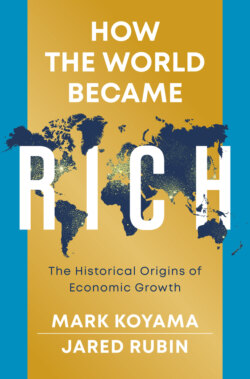Читать книгу How the World Became Rich - Mark Koyama - Страница 17
2 Did Some Societies Win the Geography Lottery?
ОглавлениеDoes geography determine the fate of nations? Is the key to unlocking riches preordained by factors like climate, natural resources, soil quality, and access to the ocean? Geographic explanations have long been a favorite of thinkers looking for reasons why their society pulled ahead. According to the Muslim Andalusian thinker Abū al-Qāsim Sā’id (1068): “The exceeding distance [of Northern Europeans] from the sun thickens the air making their dispositions cold, their natures rude, their skin color white and their hair straight. Thus … dullness and ignorance overpower them” (quoted in Chaney, 2008, p. 2). On the other hand, in Book XIV of The Spirit of the Laws, the French philosopher Montesquieu made a similar argument but drew an opposite conclusion:
People are … more vigorous in cold climates…. The inhabitants of warm countries are, like old men, timorous; the people in cold countries are, like young men, brave. If we reflect on the late wars … we shall find that the northern people, transplanted into southern regions, did not perform such exploits as their countrymen who, fighting in their own climate, possessed their full vigor and courage. (Montesquieu, 1748/1989, p. 317)
Modern scholars have also argued that geography and climate play a crucial role in explaining patterns of economic development. Perhaps the most well-known insights are those of Diamond (1997), who argues that factors like the relative length of continental axis, the disease environment, proximity to the equator, and access to coasts and rivers had a tremendous influence on long-run economic prosperity. We discuss Diamond’s influential hypothesis in depth in this chapter.
But is geography fate? Are locations with “good” characteristics destined to be more developed? Davis and Weinstein’s (2002) seminal study of Japanese urban development in the aftermath of World War II provides evidence for the importance of geographic fundamentals. The authors examined what happened to the distribution of urban centers after the destruction of Hiroshima and Nagasaki by the atomic bomb. They show that after experiencing complete destruction, both Hiroshima and Nagasaki returned to the same relative positions in Japan’s distribution of cities within twenty years. This suggests that a major shock to the distribution of population was insufficient to overcome the intrinsic geographic advantages of these two locations. Whether such findings are generalizable is something we will discuss throughout the book.
What about the Industrial Revolution? Britain’s position as a large island off the coast of Europe, endowed with a moderate climate, numerous rivers, and a long coastline, helped shape the formation of its political institutions. Abundant coal resources played an important role in its early industrialization. It is worth asking: could this be why Britain industrialized first?
